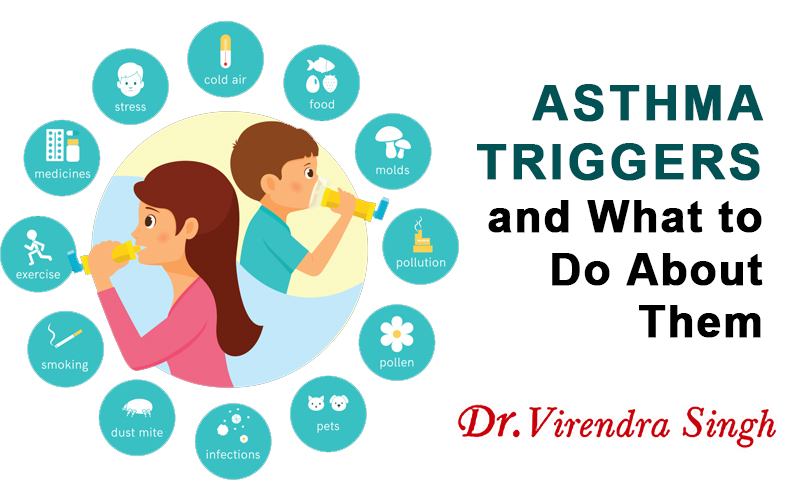
9 Asthma Triggers: Did you know that over 262 million people worldwide suffer from asthma? Asthma results in airway swelling, which shows symptoms.
Given that no remedy is yet available, it is possible to say that the treatment (also called the management) of asthma is more than just about taking care of yourself with the aid of medications.
The most annoying aspects are dust mites in your bed, the smell of your perfume, frigid outside air, and respiratory infections. Statistics also indicate that almost 80% of asthma hospitalizations can be prevented by identifying and reducing exposure to such triggering factors.
So, what are these triggers that unknowingly aggravate asthma? And what can you do to tackle the triggers for better control? This comprehensive guide discusses the top 9 asthma triggers and provides actionable tips you can adopt immediately. Read on for practical pointers on gaining control over your asthma!
1. Dust Mites
Microscopic dust mites found commonly in bedding, carpets and stuffed toys can induce asthma symptoms. To reduce exposure:
- Encase mattress and pillows in dust-proof covers.
- Wash bedding weekly in hot water.
- Limit stuffed toys or wash them weekly.
- Vacuum and dust frequently using HEPA filter vacuum.
- Limit clutter like piles of clothes where mites breed.
2. Pets (Animal Fur/Dander)
Pet fur or skin flakes can also trigger asthma in sensitive people. To minimize this trigger:
- Keep pets outdoors or limit to non-bedroom areas
- Groom and bathe pets weekly
- Vacuum furniture and floors frequently
- Use HEPA air filter in room with pets
- Give away pets if asthma is severe
Ask your doctor about allergy medications if symptoms still aggravate.
3. Strong Smells and Sprays
Scented products like perfumes, air fresheners, cleaning products contain volatile chemicals that can induce asthma symptoms when inhaled. It’s best to avoid:
- Using scented laundry products or dryer sheets
- Lighting scented candles or incense sticks
- Spraying deodorizers, perfumes and colognes
- Using scented household cleaning products
- Allowing someone wearing strong perfume around you
Switch to fragrance-free, natural options for household products.
4. Pollution and Irritants
Air pollutants, vehicular exhaust and second-hand cigarette smoke are common outdoor asthma triggers. Protect yourself by:
- Staying indoors on high-pollution days
- Wearing an N95 pollution mask when stepping out
- Installing indoor air purifiers
- Avoiding smoke-prone environments
- Choosing non-peak hours for exercising outdoors
- Taking asthma-control medication before exertion
Reducing outdoor trigger exposure goes a long way in preventing aggravated attacks.
5. Weather Changes
Sudden weather changes like dip in temperature, peak summers, humidity and storms can also trigger asthma troubles for some. You can minimize this by:
- Covering nose and mouth with a scarf in cold air
- Staying indoors during weather extremes
- Using a humidifier/dehumidifier to control indoor humidity
- Checking daily air quality index and pollen counts
- Adjusting medication dosage accordingly
- Carrying emergency inhaler when outdoors
Preparing for weather changes and adjusting to the environment can reduce this trigger’s impact.
6. Certain Foods and Medications
Certain foods, like histamine-releasing foods and drugs, trigger asthma in some asthmatics. Realizing that the most common food triggers are sulfites, found in alcohol and dried fruits, and salicylates, found in coffee, as well as some medications, such as aspirin, contributed most to my understanding of this condition.
To manage food and medication triggers:
- Keep a food diary to identify any trigger foods
- Read food labels carefully and avoid trigger ingredients
- Talk to your doctor about any medications that seem to worsen symptoms
- Carry your quick-relief inhaler in case of accidental exposure
7. Infection Exacerbation
Viral or bacterial respiratory infections like cold, flu, and sinusitis can worsen asthma control in some people. You can reduce risks by:
- Getting recommended vaccination shots in a timely
- Practicing good hand hygiene
- Following cough etiquettes
- Avoiding sick contacts
- Getting adequate sleep and a healthy diet to boost immunity
- Having an action plan ready to tackle infection exacerbation
8. Stress
Stress, laughter, yelling, and crying can also trigger asthma by causing hyperventilation and airway constriction in some people.
To manage stress-related asthma:
- Practice relaxation techniques, like deep breathing or meditation
- Get regular exercise, which can help reduce stress
- Make time for activities you enjoy
9. Strong Odors and Chemicals
Strong odors and chemical fumes can irritate the airways and trigger asthma symptoms.
To reduce exposure to strong odors and chemicals:
- Opt for fragrance-free or natural cleaning products
- Open windows when using strong chemicals
- Avoid perfumes and scented personal care items
- Choose low-VOC paints and other home improvement products
Conclusion
Identifying and subsequently reducing exposure to these common asthma triggers and adopting suitable precautions are key to preventing and controlling sudden flare-ups. Though this may seem like a considerable lifestyle adjustment, being trigger-aware can help you gain significant control over your asthma.
For professional guidance on managing asthma based on your medical history and customizing a treatment plan, consult a pulmonologist like Dr. Virendra Singh. Expert input can help you lead a symptom-free life.
